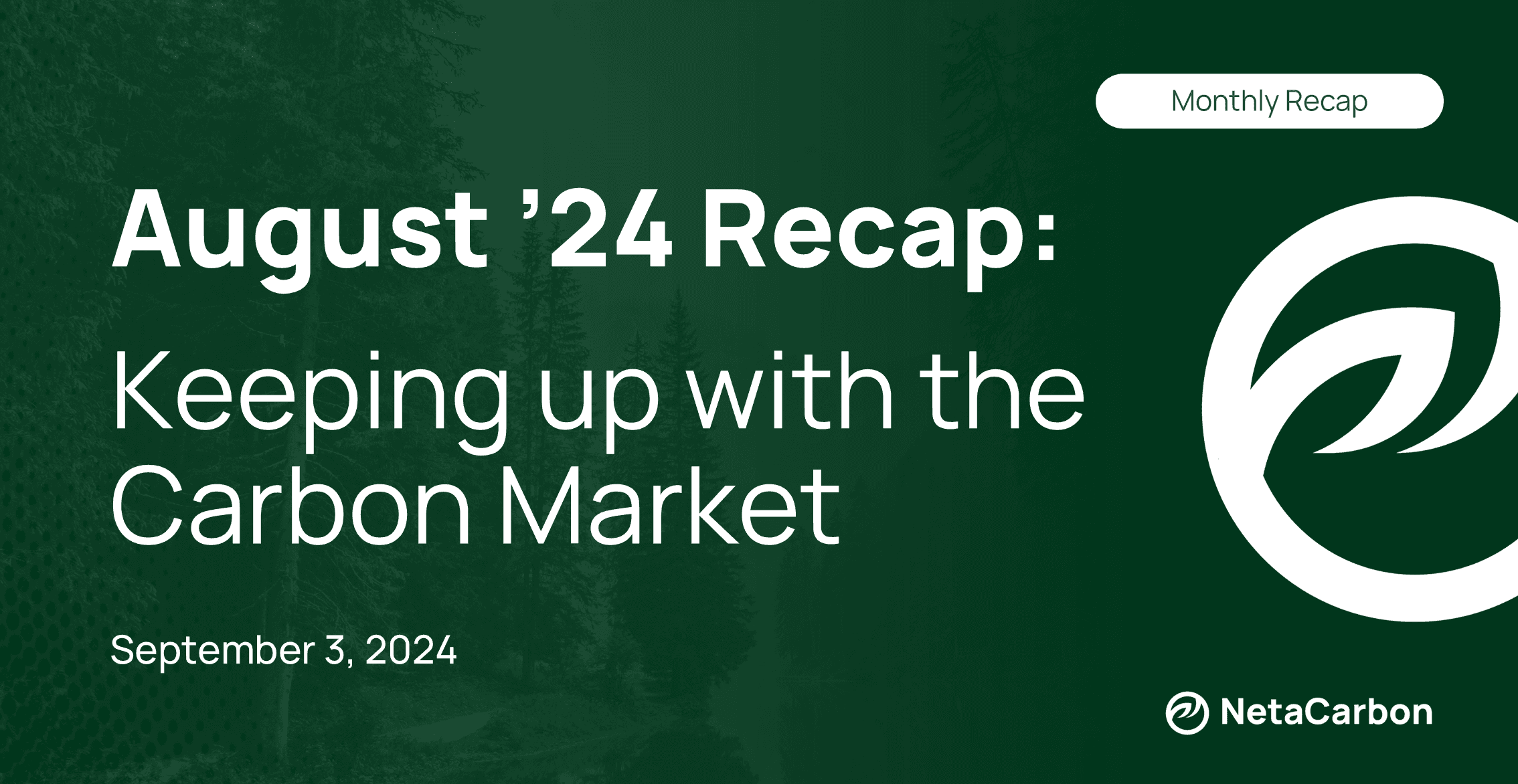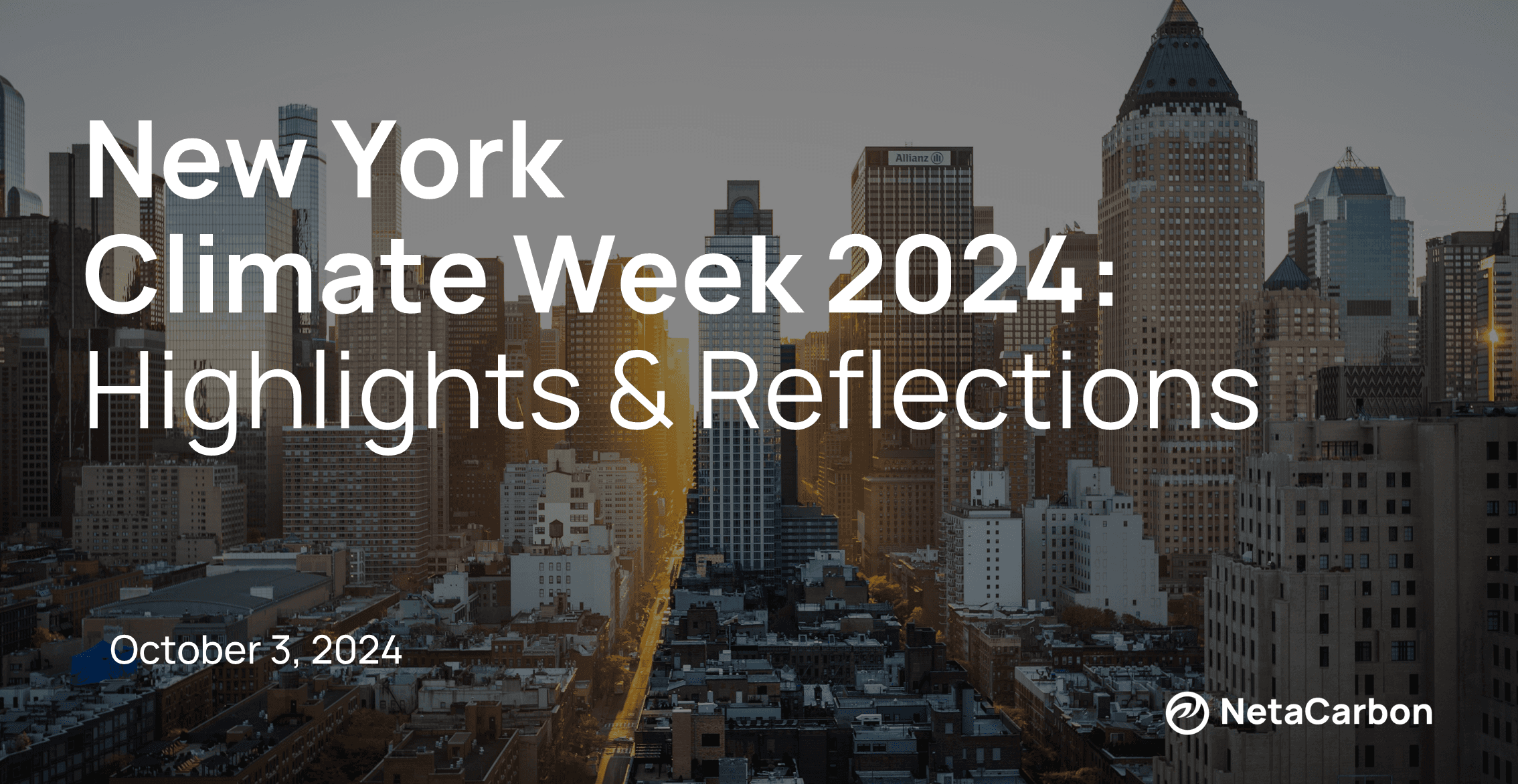Keeping up with the Carbon Market - August 2024
Keeping up with the Carbon Market - August 2024
Keeping up with the Carbon Market - August 2024
MONTHLY RECAP
September 3, 2024

Grace Lam
·
Co-Founder
We are back with another volume of our monthly newsletter, “Keeping up with the Carbon Market”! Entering the tail end of the summer, regulators and carbon market organizations have stepped up their efforts to weed out low-quality players in the market – continuing a positive trend that has been ongoing for over a year.
We covered below key market updates that are worth noting for corporate buyers and developers alike, so you can stay up to date on the carbon market!
Key highlights of the month include:
The Integrity Council for the Voluntary Carbon Market (ICVCM) excluded almost one-third of carbon credits issued under eight renewable energy methodologies from using its high-integrity Core Carbon Principles (CCP) label – a decision that could dampen demand for unretired and future credits using these methodologies.
Amazonas’ public prosecutor recommends suspicion of all REDD+ projects in its state that affect local Indigenous communities, requiring project developers to submit information following a police raid that exposed fraudulent Brazilian carbon projects.
Verra launched new additionality assessment tools and announced updates to its methodologies to align its credits with the Core Carbon Principles label.



1. ICVCM to exclude 236 million renewable energy carbon credits from its high-integrity Core Carbon Principles label
The Integrity Council for the Voluntary Carbon Market (ICVCM) recently announced a significant decision to exclude carbon credits issued under eight existing renewable energy methodologies from using its high-integrity Core Carbon Principles (CCP) label. The rejected methodologies cover approximately 236 million unretired credits and almost one-third of the carbon market. They were deemed insufficiently rigorous in proving additionality—that is, whether the projects would have proceeded without carbon credit revenues.
As mentioned in our earlier blog post, the CCP label aims to differentiate carbon credit methodologies that meet stringent quality standards, thereby bolstering trust in the market and ensuring the effectiveness of carbon credits in genuinely reducing emissions. Recognizing the challenges of deploying renewable energy globally, The Council emphasized the need for updated, more robust methodologies to assess renewable energy projects' additionality and is ready to review new methodologies once they are available.
The ICVCM also announced decisions for other less popular methodologies, approving a methane-related methodology and rejecting another due to similar concerns on additionality. Assessments of other popular types of carbon credits, such as those associated with REDD+ and clean cookstoves, are ongoing with decisions expected in the coming months. So far, only 27 million carbon credits, or 3.6% of the market have been tagged with the CCP labels.
NetaCarbon’s take: While we welcome transparent assessments and scrutiny on carbon credits that do not meet the additionality requirements, many renewable energy project developers would find it harder to sell their unretired credits in existing or upcoming projects unless they can provide additional proofs of additionality beyond the existing requirements by the registry. Major registries should react swiftly, update their methodologies, and ensure well-intentioned project developers can continue to sustain their operations with the support of carbon credit revenue.
2. Amazonas’ public prosecutor recommends suspicion of all REDD+ projects in its state
On August 9, the public prosecutor’s office of Amazonas in Brazil recommended the suspension of all activities related to REDD+ projects in its state that affect Indigenous and traditional communities, regardless of whether the project has proven legal rights to the land. The office called for the submission of relevant project information to the agency. A week later, The office further clarified that there could be legal ramifications if the counsel was not followed.
The announcement followed a police raid that exposed a fraudulent Brazilian REDD+ carbon project in the Amazon rainforest, run by Grupo Ituxi. REDD+ stands for “Reducing Emissions from Deforestation and Forest Degradation”, which refers to projects that aim to protect forests through revenue generated through carbon credits. The projects are accused of illegally appropriating lands for carbon projects and failing to share revenue with local communities. The credits in question are now suspended by Verra, and a formal review is being conducted.
NetaCarbon’s take: Buying carbon credits from fraudulent projects could pose huge reputational risks to companies and organizations, which is why we always advocate for buyers to invest in projects for transparency, rather than merely purchasing off-the-shelf credits. All market participants would benefit from better government oversight and clearer regulations, which could weed out illegal practices that harm local communities and provide clarity to well-intentioned project developers on how to manage their projects.
3. Verra announced new tools and updates to its methodologies to align its credits with the Core Carbon Principles label
This month, Verra, the leading and largest voluntary carbon standard, has made updates to its methodologies and launched consultations for new tools addressing additionality concerns from The Integrity Council for the Voluntary Carbon Market (ICVCM)’s Core Carbon Principles framework. These changes are part of a broader overhaul of its standards, responding to the heightened scrutiny the carbon market faces.
Examples of updates include:
Jurisdictional and Nested REDD+ (JNR) Framework – Updated requirements on the time horizon for risk assessment (over a 100-year horizon), program longevity (at least 40 years), and evidence to show that expected revenue from carbon credits is decisive for enabling the implementation of a jurisdictional program.
Additionality assessment tools – Public consultation on tools that replaced existing ones under the Clean Development Mechanism (CDM), which has attracted concerns from ICVCM. If approved, these new tools will allow past and future projects issued under Verra to quality for CCP labels, representing high-quality carbon projects.
NetaCarbon’s take: The updates are proof that the ICVCM’s theory of change is working – its framework instigates improvements in overall carbon credit quality through incentivizing carbon standards to update their methodologies. Meaningful improvements, however, will take time. Carbon credit buyers need to develop their capabilities to identify and source good projects, while broader industry-led efforts provide tailwinds to rebuild confidence in the overall market.
1. ICVCM to exclude 236 million renewable energy carbon credits from its high-integrity Core Carbon Principles label
The Integrity Council for the Voluntary Carbon Market (ICVCM) recently announced a significant decision to exclude carbon credits issued under eight existing renewable energy methodologies from using its high-integrity Core Carbon Principles (CCP) label. The rejected methodologies cover approximately 236 million unretired credits and almost one-third of the carbon market. They were deemed insufficiently rigorous in proving additionality—that is, whether the projects would have proceeded without carbon credit revenues.
As mentioned in our earlier blog post, the CCP label aims to differentiate carbon credit methodologies that meet stringent quality standards, thereby bolstering trust in the market and ensuring the effectiveness of carbon credits in genuinely reducing emissions. Recognizing the challenges of deploying renewable energy globally, The Council emphasized the need for updated, more robust methodologies to assess renewable energy projects' additionality and is ready to review new methodologies once they are available.
The ICVCM also announced decisions for other less popular methodologies, approving a methane-related methodology and rejecting another due to similar concerns on additionality. Assessments of other popular types of carbon credits, such as those associated with REDD+ and clean cookstoves, are ongoing with decisions expected in the coming months. So far, only 27 million carbon credits, or 3.6% of the market have been tagged with the CCP labels.
NetaCarbon’s take: While we welcome transparent assessments and scrutiny on carbon credits that do not meet the additionality requirements, many renewable energy project developers would find it harder to sell their unretired credits in existing or upcoming projects unless they can provide additional proofs of additionality beyond the existing requirements by the registry. Major registries should react swiftly, update their methodologies, and ensure well-intentioned project developers can continue to sustain their operations with the support of carbon credit revenue.
2. Amazonas’ public prosecutor recommends suspicion of all REDD+ projects in its state
On August 9, the public prosecutor’s office of Amazonas in Brazil recommended the suspension of all activities related to REDD+ projects in its state that affect Indigenous and traditional communities, regardless of whether the project has proven legal rights to the land. The office called for the submission of relevant project information to the agency. A week later, The office further clarified that there could be legal ramifications if the counsel was not followed.
The announcement followed a police raid that exposed a fraudulent Brazilian REDD+ carbon project in the Amazon rainforest, run by Grupo Ituxi. REDD+ stands for “Reducing Emissions from Deforestation and Forest Degradation”, which refers to projects that aim to protect forests through revenue generated through carbon credits. The projects are accused of illegally appropriating lands for carbon projects and failing to share revenue with local communities. The credits in question are now suspended by Verra, and a formal review is being conducted.
NetaCarbon’s take: Buying carbon credits from fraudulent projects could pose huge reputational risks to companies and organizations, which is why we always advocate for buyers to invest in projects for transparency, rather than merely purchasing off-the-shelf credits. All market participants would benefit from better government oversight and clearer regulations, which could weed out illegal practices that harm local communities and provide clarity to well-intentioned project developers on how to manage their projects.
3. Verra announced new tools and updates to its methodologies to align its credits with the Core Carbon Principles label
This month, Verra, the leading and largest voluntary carbon standard, has made updates to its methodologies and launched consultations for new tools addressing additionality concerns from The Integrity Council for the Voluntary Carbon Market (ICVCM)’s Core Carbon Principles framework. These changes are part of a broader overhaul of its standards, responding to the heightened scrutiny the carbon market faces.
Examples of updates include:
Jurisdictional and Nested REDD+ (JNR) Framework – Updated requirements on the time horizon for risk assessment (over a 100-year horizon), program longevity (at least 40 years), and evidence to show that expected revenue from carbon credits is decisive for enabling the implementation of a jurisdictional program.
Additionality assessment tools – Public consultation on tools that replaced existing ones under the Clean Development Mechanism (CDM), which has attracted concerns from ICVCM. If approved, these new tools will allow past and future projects issued under Verra to quality for CCP labels, representing high-quality carbon projects.
NetaCarbon’s take: The updates are proof that the ICVCM’s theory of change is working – its framework instigates improvements in overall carbon credit quality through incentivizing carbon standards to update their methodologies. Meaningful improvements, however, will take time. Carbon credit buyers need to develop their capabilities to identify and source good projects, while broader industry-led efforts provide tailwinds to rebuild confidence in the overall market.
1. ICVCM to exclude 236 million renewable energy carbon credits from its high-integrity Core Carbon Principles label
The Integrity Council for the Voluntary Carbon Market (ICVCM) recently announced a significant decision to exclude carbon credits issued under eight existing renewable energy methodologies from using its high-integrity Core Carbon Principles (CCP) label. The rejected methodologies cover approximately 236 million unretired credits and almost one-third of the carbon market. They were deemed insufficiently rigorous in proving additionality—that is, whether the projects would have proceeded without carbon credit revenues.
As mentioned in our earlier blog post, the CCP label aims to differentiate carbon credit methodologies that meet stringent quality standards, thereby bolstering trust in the market and ensuring the effectiveness of carbon credits in genuinely reducing emissions. Recognizing the challenges of deploying renewable energy globally, The Council emphasized the need for updated, more robust methodologies to assess renewable energy projects' additionality and is ready to review new methodologies once they are available.
The ICVCM also announced decisions for other less popular methodologies, approving a methane-related methodology and rejecting another due to similar concerns on additionality. Assessments of other popular types of carbon credits, such as those associated with REDD+ and clean cookstoves, are ongoing with decisions expected in the coming months. So far, only 27 million carbon credits, or 3.6% of the market have been tagged with the CCP labels.
NetaCarbon’s take: While we welcome transparent assessments and scrutiny on carbon credits that do not meet the additionality requirements, many renewable energy project developers would find it harder to sell their unretired credits in existing or upcoming projects unless they can provide additional proofs of additionality beyond the existing requirements by the registry. Major registries should react swiftly, update their methodologies, and ensure well-intentioned project developers can continue to sustain their operations with the support of carbon credit revenue.
2. Amazonas’ public prosecutor recommends suspicion of all REDD+ projects in its state
On August 9, the public prosecutor’s office of Amazonas in Brazil recommended the suspension of all activities related to REDD+ projects in its state that affect Indigenous and traditional communities, regardless of whether the project has proven legal rights to the land. The office called for the submission of relevant project information to the agency. A week later, The office further clarified that there could be legal ramifications if the counsel was not followed.
The announcement followed a police raid that exposed a fraudulent Brazilian REDD+ carbon project in the Amazon rainforest, run by Grupo Ituxi. REDD+ stands for “Reducing Emissions from Deforestation and Forest Degradation”, which refers to projects that aim to protect forests through revenue generated through carbon credits. The projects are accused of illegally appropriating lands for carbon projects and failing to share revenue with local communities. The credits in question are now suspended by Verra, and a formal review is being conducted.
NetaCarbon’s take: Buying carbon credits from fraudulent projects could pose huge reputational risks to companies and organizations, which is why we always advocate for buyers to invest in projects for transparency, rather than merely purchasing off-the-shelf credits. All market participants would benefit from better government oversight and clearer regulations, which could weed out illegal practices that harm local communities and provide clarity to well-intentioned project developers on how to manage their projects.
3. Verra announced new tools and updates to its methodologies to align its credits with the Core Carbon Principles label
This month, Verra, the leading and largest voluntary carbon standard, has made updates to its methodologies and launched consultations for new tools addressing additionality concerns from The Integrity Council for the Voluntary Carbon Market (ICVCM)’s Core Carbon Principles framework. These changes are part of a broader overhaul of its standards, responding to the heightened scrutiny the carbon market faces.
Examples of updates include:
Jurisdictional and Nested REDD+ (JNR) Framework – Updated requirements on the time horizon for risk assessment (over a 100-year horizon), program longevity (at least 40 years), and evidence to show that expected revenue from carbon credits is decisive for enabling the implementation of a jurisdictional program.
Additionality assessment tools – Public consultation on tools that replaced existing ones under the Clean Development Mechanism (CDM), which has attracted concerns from ICVCM. If approved, these new tools will allow past and future projects issued under Verra to quality for CCP labels, representing high-quality carbon projects.
NetaCarbon’s take: The updates are proof that the ICVCM’s theory of change is working – its framework instigates improvements in overall carbon credit quality through incentivizing carbon standards to update their methodologies. Meaningful improvements, however, will take time. Carbon credit buyers need to develop their capabilities to identify and source good projects, while broader industry-led efforts provide tailwinds to rebuild confidence in the overall market.
Since you made it this far, why not sign up for our newsletter?
Since you made it this far, why not sign up for our newsletter?

Make smarter
packaging decisions
See how we can cut your time spent on packaging compliance and data tracking by half

Make smarter
packaging decisions
See how we can cut your time spent on packaging compliance and data tracking by half

Make smarter
packaging decisions
See how we can cut your time spent on packaging compliance and data tracking by half




